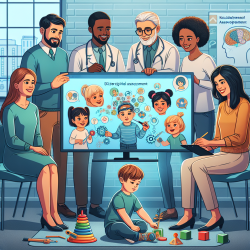In the ever-evolving field of language intervention, the roles of language specialists continue to expand, offering new insights and strategies for enhancing communication skills among children. Drawing upon the research presented by Gary Holdgrafer in "Expanding Roles of Language Specialists," this blog explores how practitioners can improve their skills and approaches to language intervention by embracing these expanding roles.
The research underscores the importance of moving beyond traditional methodologies that primarily focus on the structure of language. Instead, it highlights the need for a multi-dimensional approach that incorporates syntax, semantics, and pragmatics, recognizing the crucial role of social context in language development. Let's delve into the four major roles of language specialists as outlined by Holdgrafer, offering case studies for practical illustration.
- Teacher Role: Traditionally, language specialists have focused on direct instruction emphasizing the form and structure of language. However, the critique of this approach lies in its initial disregard for the communicative function of language in social interaction. To address this, language specialists can integrate traditional teaching with strategies that promote functional communication, tailoring instruction to the child's communicative competence.
- Engineer Role: This role involves creating environments that naturally encourage children to use language for communication. By engineering the physical and social environment to elicit language use, specialists can foster spontaneous speech. The case of C.M., a child who learned to use verbalizations through engineered contexts, exemplifies how creating needs for communication can significantly enhance language intervention outcomes.
- Facilitator Role: Emphasizing the child's active exploration of their environment, the facilitator role involves following the child's lead in play and interaction. This approach allows for the introduction of linguistic forms that are directly relevant to the child's interests, promoting more meaningful and effective language learning. The case of Walt, who engaged in shared attention and activity around his interest in pipes, illustrates the power of facilitation in encouraging communicative exchanges.
- Case Manager Role: Recognizing that language learning occurs within the totality of the child's environment, the case manager role involves coordinating a comprehensive intervention strategy. This includes involving parents, teachers, and peers in the assessment and treatment process, ensuring that language learning is supported across all environments. The approach underscores the importance of generalization training from the outset of intervention.
By embracing these roles, language specialists can offer more comprehensive and effective language intervention strategies. The evolving roles highlight the shift from a narrow focus on language structure to a broader perspective that considers the communicative function of language within social contexts. This approach not only enhances the specialists' ability to support language development but also empowers children to use language more effectively in their social environments.
In conclusion, the expanding roles of language specialists reflect the dynamic nature of language intervention. By integrating these roles into their practice, specialists can enhance their methodologies, offering more holistic and effective support for children with communication challenges. For those interested in further exploring this topic, Expanding Roles of Language Specialists provides valuable insights and case studies that illustrate the practical application of these concepts.










